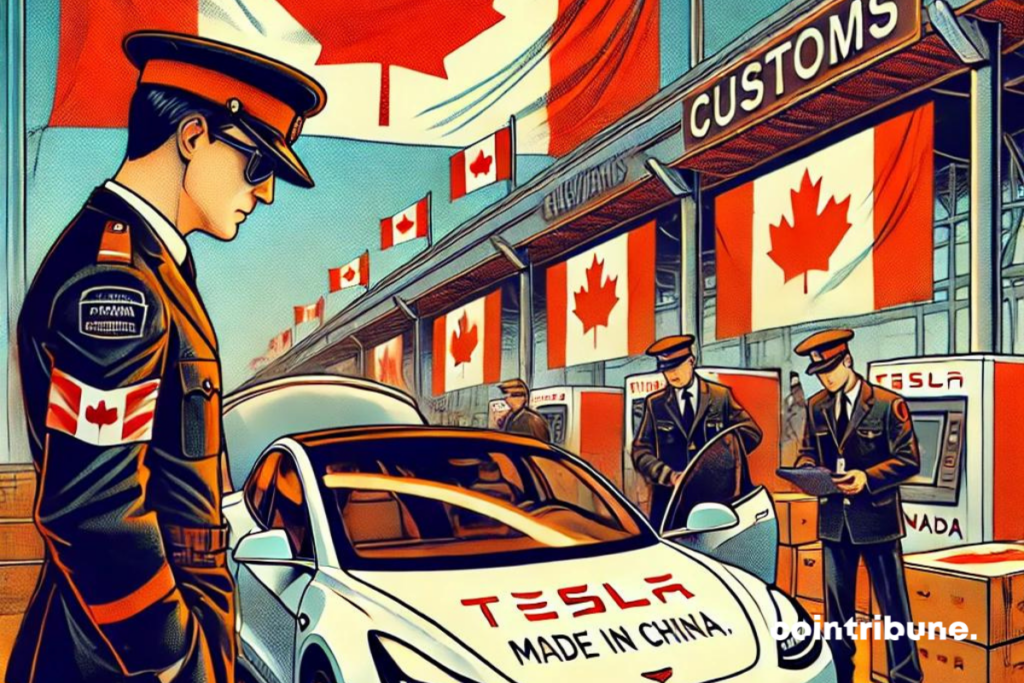Economy: Canada joins the EU in the trade war against China over electric vehicles
Canada has just added fuel to the fire. Prime Minister Justin Trudeau’s announcement of a 100% tariff on electric vehicles (EVs) imported from China, including Tesla models manufactured in Shanghai, marks a significant step in the country’s trade policy. This decision comes amid rising tensions between the world’s major economic powers, where each new tariff measure risks causing major upheavals in financial markets and further complicates diplomatic relations.

The new Canadian tariff policy
The Canadian government has announced the implementation of a new 100% tax on certain imports, scheduled for October 1st. This measure, justified by Ottawa as a necessary response to China’s overproduction practices, aligns with similar policies in the United States and the European Union. Canada accuses China of seeking to dominate international markets unfairly, which has led to this firm decision.
In 2023, Chinese vehicle imports at the Port of Vancouver skyrocketed by 460%, primarily due to shipments of Tesla models manufactured in Shanghai to Canada. This situation perfectly illustrates the growing influence of Chinese trade strategies on the Canadian market and echoes the recent tensions between China and the European Union regarding taxes on electric cars.
Furthermore, this new tax aims to encourage investments in the local supply chain of electric vehicles. Canada thus seeks to position itself as a major player in this rapidly expanding sector.
China’s reactions and potential consequences for the Canadian economy
China’s response was swift. The spokesperson for the Chinese embassy in Ottawa immediately denounced this tax as a “protectionist” and “politically dominant” measure. He accuses Canada of flouting World Trade Organization (WTO) rules.
The consequences of this decision on trade relations between Canada and China could be severe. As Canada’s second-largest trading partner after the United States, China could consider retaliatory measures by targeting Canada’s strategic exports such as oil, canola, and other raw materials. Moreover, this situation could force automakers, like Tesla, to reconsider their production and logistics strategies, leading to higher costs and disruptions in the supply chain.
Through this significant decision, Canada takes a bold stance in its trade policy. However, it risks causing repercussions in the global electric vehicle market and international relations, particularly in the face of a China always ready to retaliate with very explosive measures.
Maximize your Cointribune experience with our "Read to Earn" program! For every article you read, earn points and access exclusive rewards. Sign up now and start earning benefits.
Diplômé de Sciences Po Toulouse et titulaire d'une certification consultant blockchain délivrée par Alyra, j'ai rejoint l'aventure Cointribune en 2019. Convaincu du potentiel de la blockchain pour transformer de nombreux secteurs de l'économie, j'ai pris l'engagement de sensibiliser et d'informer le grand public sur cet écosystème en constante évolution. Mon objectif est de permettre à chacun de mieux comprendre la blockchain et de saisir les opportunités qu'elle offre. Je m'efforce chaque jour de fournir une analyse objective de l'actualité, de décrypter les tendances du marché, de relayer les dernières innovations technologiques et de mettre en perspective les enjeux économiques et sociétaux de cette révolution en marche.
The views, thoughts, and opinions expressed in this article belong solely to the author, and should not be taken as investment advice. Do your own research before taking any investment decisions.